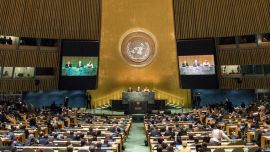Government and opposition lawmakers in the lower house put aside tensions on Thursday to approve the passage of a blood plasma donation law designed to assist efforts to tackle the coronavirus pandemic.
The bill to create a National Programme for the Donation of Blood Plasma will advance to the Senate, after receiving 229 affirmative votes from lawmakers in the Chamber of Deputies.
The house held its third remote session this Thursday, during which the bill was debated. The programme would promote efforts to retain the blood plasma of patients who have recovered from coronavirus.
The legislation creates a series of incentives to encourage voluntary donation of blood plasma, such as the granting of two days of paid leave for employees in a dependent relationship, as well as transportation facilities to and from health centres and an official recognition as "outstanding citizens of solidarity of the Argentine republic"
The initiative was presented to the lower house on Wednesday by the chief of the Frente de Todos caucus, Máximo Kirchner, but was built on cooperation between the ruling party and the opposition, who have been gripped by tensions over the government's proposed move to nationalise the bankrupt agro-exporting firm Vicentin.
The blood plasma bill also bears the signature of the president of the PRO bloc, Cristian Ritondo, as well as the president and vice-president of the commission for Social Action and Public Health, Pablo Yedlin (Frente de Todos) and Carmen Polledo (PRO), who worked to unify seven proposals into a single consensus-seeking bill.
"It is imperative that society as a whole values the donation of those who, after having gone through a distressing situation, cooperate to improve the quality of life of others," reads the text of the bill..
Beginning the debate, Yedlin acknowledged that the effectiveness of this type of treatment is still "not known for sure." However, he said that it was necessary to "promote" this "gesture of solidarity" since the voluntary donation of plasma at present "is very low.”
"In recent months, due to the difficulty of transferring donors and fear of going to hospitals and clinics, it has generated a very significant deficit," explained the Tucuman politician.
Polledo stressed that the project seeks to "raise awareness, invite, inform and train citizens, especially those who have recovered, to be donors."
"In Argentina there are more than 13,000 people who have recovered from Covid-19, but the number of patients who donate is low," she explained.
Radical deputy Josefina Mendoza was optimistic about the effectiveness of plasma treatment and appreciated that the national state "invested in this because it is not the vaccine but it has demonstrated the ability to save lives."
- TIMES/PERFIL/NA
![]()



















Comments